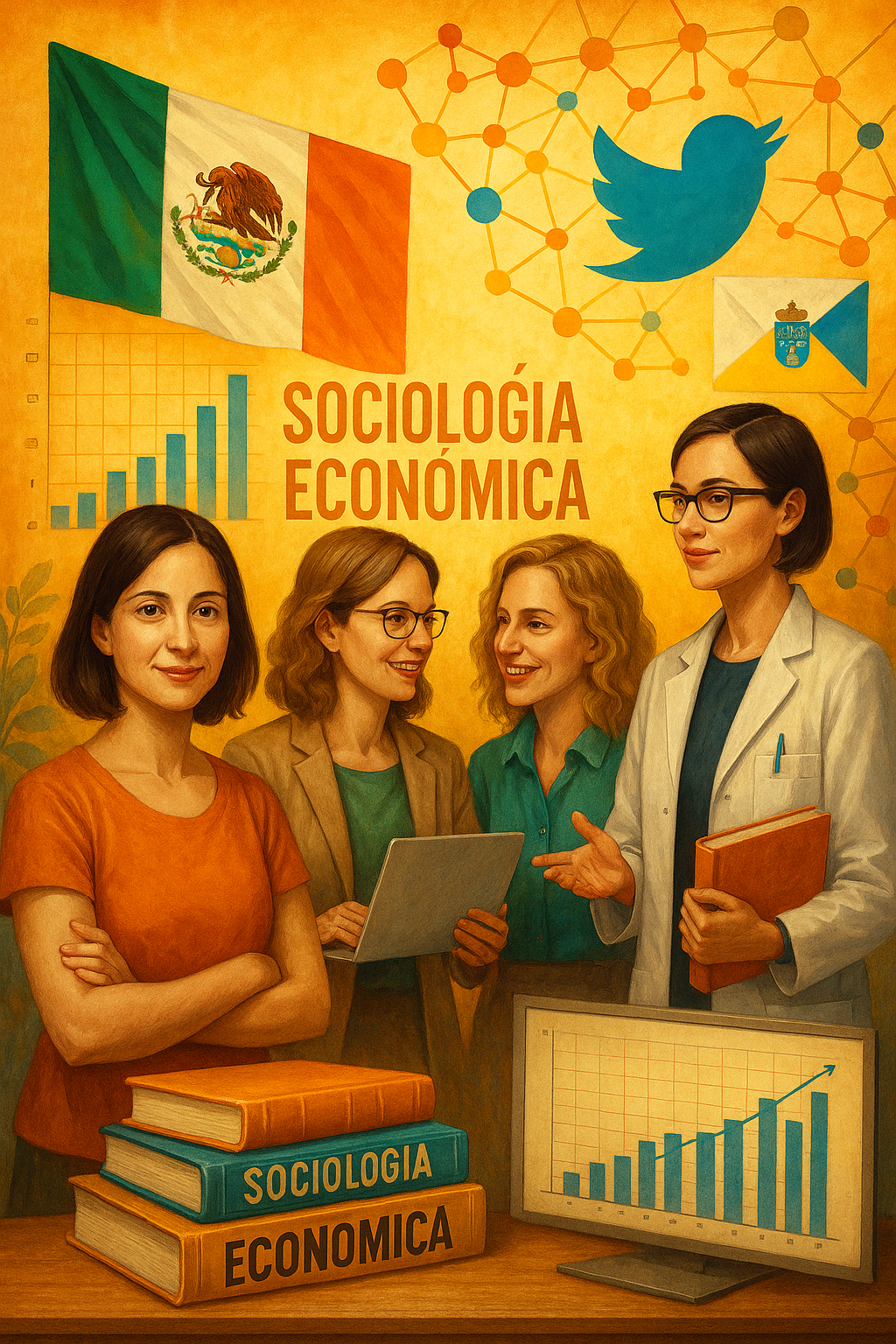El consumidor endeudado: un análisis microsociológico del mercado de préstamos morosos
DOI:
https://doi.org/10.22325/fes/res.2025.260Palabras clave:
moroso, préstamos morosos, reestructuración crediticia, análisis de marco, netnografíaResumen
El impago en las relaciones crediticias ha impulsado la creación de mercados de préstamos morosos, donde empresas especializadas compran préstamos dudosos a tipos de interés reducidos para cobrarlos o revenderlos. En Turquía, el crecimiento del mercado de crédito al consumo ha agravado los problemas de préstamos morosos. Tras la crisis bancaria de 2001, se permitió la venta de estos préstamos a empresas de gestión de activos (AMC). Los prestatarios morosos no controlan la venta de sus deudas y a menudo son contactados insistentemente por las AMC para garantizar la devolución de los préstamos. Persisten quejas sobre la calidad y el trato de las AMC, debido a prácticas de estigmatización y acoso. Este artículo, basado en investigación etnográfica y análisis del discurso, examina cómo las AMC reestructuran los patrones de incumplimiento de las deudas personales durante la reestructuración de préstamos dudosos mediante marcos goffmanescos.
Citas
Alioğlu, A. M. (2022). Borçlunun ailesini arayana 50 bin TL ceza. Yenişafak. https://www.yenisafak.com/gundem/borclunun-ailesini-arayana-50-bin-tl-ceza-3893759
Bauman, Z. (2010). Living on Borrowed Times: Conversations with Citlali Rovirosa-Madrazo. Cambridge: Polity Press.
Belshaw, C. S. (1965). Traditional Exchange and Modern Markets. Prentice-Hall Inc.
Benedict, B. (1964). Capital, saving and credit among Mauritian Indians. In R. Firth, & B. S. Yamey (Eds.), Capital, Savings and Credit in Peasant Societies: Studies from Asia, Oceania, the Caribbean and Middle America (pp. 330-346). Londra, Allen & Unwin.
Caplowitz, D. (1967). The Poor Pay More. The Free Press.
Chirichigno, G. C. (1993). Debt-Slavery in Israel and the Ancient Near East. JSOT Press.
Deville, J. (2013). Paying with Plastic: The Enduring Presence of the Credit Card. In J. Gabrys, G. Hawkins, & M. Michael (Eds.), Accumulation: The Material Politics of Plastic (pp. 87-104). Routledge.
Deville, J. (2015a). Lived Economies of Default: Consumer Credit, Debt Collection and the Capture of Affect. Routledge.
Deville, J. (2015b). Debtor publics: tracking the participatory politics of consumer credit. Consumption Markets & Culture, 19(1), 38-55, https://doi.org/10.1080/10253866.2015.1068169
Dünya. (2023). Ünlüdoğan: tahsili gecikmiş alacakta esas artış 2024-2025’te. Dünya. https://www.dunya.com/ekonomi/unludogan-tahsili-gecikmis-alacakta-esas-artis-2024-2025te-haberi-689564
Dünya Varlık. (2024). Dünya Varlık kimdir. Dünya Varlık. https://www.dunyavarlik.com/dunya-varlik-kimdir#g
Foucault, M. (1978). The History of Sexuality: The Will to Know. R. Hurley (Trans.). New York: Pantheon Books.
Foucault, M. (2001). The subject and power. In J. D. Faubion (Eds.), Essential Works of Foucault, 1954-1984: V.3 Power (pp. 326-348). The New Press.
Foucault, M. (2009). Security, Territory, Population: Lectures at the College de France, 1977-1978. Palgrave.
Gazete Kritik. (2022). Gürsel Tekin, “Varlık şirketleri vatandaşları adeta canından bezdirdi”. Gazete Kritik. https://www.gazetekritik.com/vekil-haberleri/gursel-tekin-varlik-sirketleri-vatandaslari-adeta-canindan-bezdirdi-h158997.html
Gelecek Varlık. (2024). Misyonumuz. Gelecek Varlık. https://www.gelecekvarlik.com.tr
Goffman, E. (1983). The Interaction Order: American Sociological Association, 1982 Presidential Address. American Sociological Review, 48(1), 1-17, https://doi.org/10.2307/2095141
Goffman, E. (1986). Frame Analysis: An Essay on the Organization of Experience. Northeastern University Press.
Graeber, D. (2011). Debt: the First 5,000 Years. Melivelle House.
Halkbank. (2009). Halkbank sorunlu krediler için yapılandırma programı başlattı. Halkbank. https://www.halkbank.com.tr/images/archive2008/misc/Yatirimci/Basin_bultenleri_ve_duyurular/borcyapilandirma.pdf
Hochschild, A. R. (2012). The Managed Heart: Commercialization of Human Feeling. University of California Press.
Hudson, M. (2018). And Forgive Them Their Debts: Lending, Foreclosure and Redemption from Bronze Age Finance to the Jubilee Year. ISLET.
Langley, P. (2008). The Everyday Life of Global Finance: Saving and Borrowing in Anglo-America. Oxford University Press.
Manning, R. D. (2000). Credit Card Nation: The Consequences of America’s Addiction to Credit. Basic Books.
Marron, D. (2009). Consumer Credit in the United States: A Sociological Perspective from the 19th Century to the Present. Palgrave.
MacKenzie, D. (2019). How algorithms interact: Goffman’s ‘interaction order’ in automated trading. Theory, Culture & Society, 36(2), 39-59, https://doi.org/10.1177/0263276419829541
Mertens, D. & Metz, C. (2022). Night of the living debt: Non-performing loans and the politics of making an asset class in Europe. In B. Braun, & K. Koddenbrock (Eds.), Capital Claims: The Political Economy of Global Finance (pp. 169-188). Routledge.
Merton, R. (1968). Social Theory and Social Structure. The Free Press.
Preda, A. (2017). Noise: Living and Trading in Electronic Finance. The University of Chicago Press.
Rao, Y., & McDonald, T. (2023). Debt at a distance: Counter-collection strategies and financial subjectivities of China’s working-class defaulters during COVID-19. Economy and Society, 52(2), 250-273, https://doi.org/10.1080/03085147.2022.2154501
Rock, P. (1968). Making People Pay. Routledge.
Rosenthal, C. (2018). Accounting for Slavery: Masters and Management. Harvard University Press.
Tarmur, S. & Cığızoğlu, O. (2018). Turkish NPL purchasing market overview and the way forward. PWC. http://docplayer.net/101478506-Turkish-npl-purchasing-market-overview-and-the-way-forward.html
Taylor, A. (2002). Working Class Credit and Community since 1918. Palgrave.
Trumbull, G. (2014). Consumer Lending in France and America: Credit and Welfare. Cambridge University Press.
Weber, M. (1978). Economy and Society: An Outline of Interpretive Sociology. University of California Press.
Yudin, G. & Pavlyutkin, I. (2015). Recording the Ambiguity. Cultural Studies, 29(5-6), 807-826, https://doi.org/10.1080/09502386.2015.1017145
Descargas
Publicado
Cómo citar
Número
Sección
Licencia
Derechos de autor 2025 M. Fatih Karakaya

Esta obra está bajo una licencia internacional Creative Commons Atribución-NoComercial 4.0.
Todas las publicaciones de la Revista Española de Sociología se realizarán bajo una licencia abierta Creative Commons de Reconocimiento 4.0 Internacional (CC BY 4.0). Dicha licencia establece que los autores son los poseedores de los derechos de propiedad intelectual de sus trabajos, que pueden redistribuirse a cambio de un reconocimiento adecuado. Para más información de la licencia Creative Commons, consultar aquí.
Una vez aceptado un artículo para su publicación, la Revista Española de Sociología solicitará al denominado "autor para la correspondencia" la aceptación de una licencia obligatoria Creative Commons incluida en un acuerdo o contrato de publicación.




